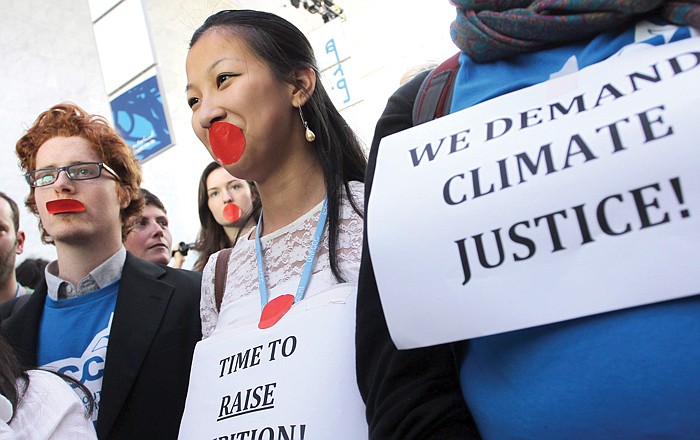DOHA, Qatar (AP) - Delegates worked through the night to salvage a deal at United Nations climate talks, as efforts to bridge gaps over financing for poor countries and demand for bolder actions by rich countries on emissions made little headway.
The two-week U.N. conference in the Qatar capital of Doha was never meant to yield a global climate pact to curb emissions of greenhouse gases - that has been put off until 2015. But even the modest goals of extending the Kyoto Protocol and laying the groundwork for the 2015 deal only served to reopen old disputes between rich and poor countries that have dogged the talks for decades.
And with the negotiations on the brink of failure, activists said they were giving up hope that any deal would include tough measures to protect the planet from the effects of global warming.
"The deal in Doha is a recipe for disaster. The deal in Doha is a coffin for the planet," said Michael Dorsey, a professor at Wesleyan University in Connecticut, speaking outside the negotiations. "We will see the failure to have emission targets sufficiently high enough. We are going to see the failure to move critical resources to countries on the margin in the developing world who desperately need resources to get out ahead of the unfolding climate catastrophe that is playing out around the planet."
Most of the key disputes revolved around money.
Poor countries, especially a coalition of island nations and African countries, came into the talks demanding a timetable on how rich countries will scale up climate change aid for them to $100 billion annually by 2020 - a general pledge that was made three years ago - and how they will raise the money. They also want a mechanism established to deal with what is called "loss and damage" to help them clean up from natural disasters linked to climate change.
But rich nations, including the United States, members of the European Union and Japan remain in the midst of a financial crisis and were not interested in detailed talks on aid at this meeting. The current text on financing agrees only to continue "scaling up" aid until 2020 and delays most detailed decisions until 2013. It includes no midterm targets or mechanisms - such as a tax - for raising the revenue.
With the rich nations refusing to budge on aid, many activists blamed the deadlock on the United States which unlike many European countries has failed to make any new pledges for assistance in 2013.
"It's troubling that some developing countries, for example the U.S., are very skeptical toward doing anything beyond saying "we have made a promise of $100 billion by 2020,"' said Norwegian Environment Minister Baard Solhjell.
Governments have set a deadline of 2015 to agree on a wider deal that would include both developed and developing countries, which now produce a majority of the world's emissions. As part of that, delegates were also trying to make progress on the 2015 work plan and close loopholes that would bring all countries into one negotiating path.
On paper, these issues seemed routine.
The goal of the U.N. talks is to keep temperatures from rising more than 3.6 degrees Fahrenheit (2 Celsius), compared to preindustrial times. Temperatures have already risen about 1.4 degrees Fahrenheit (0.8 Celsius) above that level, according to the latest report by the U.N.'s top climate body.

